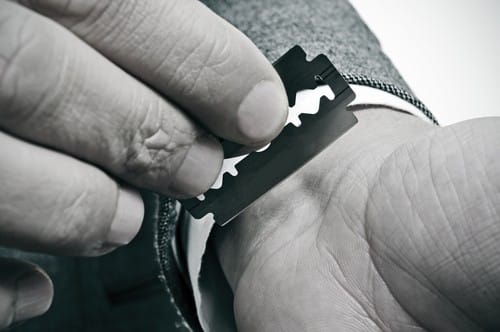By understanding the dos and don’ts of helping teens with depression, parents can approach their teens in a way that’s more effective. While your instinct is to protect and fix things, it’s essential to recognize that depression is complex. Parents need to balance support with respect for their teen’s individual experience. Knowledge of the dos and don’ts is a significant first step in providing effective support.
Depression in teens is a challenging and sensitive issue, requiring a careful balance of support, understanding, and boundaries.
As a parent, it can be overwhelming to discern the best way to help your struggling teen. The path to supporting a teen with depression isn’t always clear, but with the right knowledge and approach, you can make a meaningful difference in their lives.
In this article, we explore the dos and don’ts of helping teens with depression.
What Parents Should Know about Teen Depression
Teen depression is a serious mental health issue that goes beyond typical adolescent mood swings. According to the National Institute of Mental Health (NIMH), 4.1 million American teens had at least one major depressive episode in 2020.
It can manifest in various ways, including persistent sadness, loss of interest in activities once enjoyed, or changes in sleeping and eating patterns. Teens may also exhibit unexplained physical symptoms like headaches or stomachaches.
It’s crucial for parents to recognize that teen depression is not a weakness or something that can be overcome with willpower – it requires professional intervention.
Understanding the risk factors, such as family history, trauma, or bullying, can also be helpful. Teen depression can significantly impair a teenager’s ability to function in daily life and, in severe cases, can lead to self-harm or suicidal thoughts.
Early detection and support are vital. By being informed, parents can take proactive steps in identifying signs of depression and seeking appropriate help for their teen.
Related: 12 Common Teen Depression Symptoms
The Dos and Don’ts of Helping Teens with Depression
Navigating the complexities of teen depression requires a nuanced approach.
As a parent, your role is pivotal in providing the right kind of support and environment for healing and growth. From maintaining open communication to ensuring they receive professional help, the approach you take can significantly impact their recovery journey.
Here are the dos and don’ts of helping teens with depression.
What You Can Do
To effectively support a teen with depression, it’s essential to foster a supportive and understanding home environment.
Listen Actively: Active listening involves fully concentrating, understanding, responding, and remembering what your teen says. It’s about giving them your undivided attention and acknowledging their feelings without judgment. This approach shows that you value their thoughts and emotions, creating a safe space for open communication.
Promote Healthy Habits: Encourage your teen to adopt healthy habits like regular exercise, balanced nutrition, and sufficient sleep. These habits not only improve physical health but also have a significant positive impact on mental well-being. A structured routine with these elements can provide stability and a sense of control for teens battling depression.
Provide Unconditional Support: Offering unconditional support means being there for your teen without conditions or expectations. It’s about accepting them as they are and showing love and support regardless of their mood or behavior. This unwavering support helps build their self-esteem and assures them they’re not alone in their struggles.
Educate Yourself: Educating yourself about depression is crucial to understanding what your teen is going through. Learn about its symptoms, treatments, and ways to support someone with depression. This knowledge not only helps in providing appropriate support but also in empathizing with your teen’s experience.
Be Patient: Patience is key when dealing with teen depression. Recovery is a process that takes time and can have ups and downs. Being patient shows your teen that you understand the complexity of their situation and are willing to support them through their healing journey at their own pace.
Encourage Professional Help: Encouraging your teen to explore professional help is vital. Mental health professionals can provide the necessary teen depression treatment and guidance. It’s important to communicate that seeking help is a sign of strength, not weakness, and it’s a crucial step towards recovery.
What You Should Not Do
When helping a teen with depression, it’s vital to avoid certain behaviors that could hinder their progress.
Don’t Dismiss Their Feelings: It’s essential not to dismiss or trivialize your teen’s feelings. Depression is a serious condition, and their emotions are valid and real. Avoid saying things like “just cheer up” or “you have nothing to be depressed about.” Acknowledge their pain and struggles, showing them that you take their feelings seriously. This validation is crucial for building trust and understanding.
Avoid Punishment for Depression-Related Behavior: Recognize that certain behaviors, such as withdrawal, irritability, or a decline in school performance, can be manifestations of depression. Punishing your teen for these behaviors can exacerbate their feelings of worthlessness and hopelessness. Instead, approach these changes with empathy and understanding, seeking to understand the root cause rather than responding with discipline.
Don’t Force Conversations: While open communication is important, it’s also crucial not to pressure your teen into talking before they’re ready. Respect their need for space and time to process their feelings. Let them know you’re available to listen whenever they feel ready to talk. Forcing conversations can lead to further withdrawal and resistance to sharing.
Avoid Overwhelming Advice: Bombarding your teen with advice or trying to fix their problems can be overwhelming and counterproductive. It’s better to offer guidance and support rather than solutions. Allow them to make decisions about their treatment and recovery process. Your role is to support and empower them, not to solve their problems for them.
Don’t Ignore Warning Signs: Take any signs of self-harm, suicidal thoughts, or major changes in behavior seriously. These are critical warning signs that require immediate attention. Do not dismiss them as typical teenage drama or a phase. Seek professional help immediately if you notice any alarming signs. Early intervention can be lifesaving in cases of severe depression.
Teen Depression Treatment
Are you feeling overwhelmed trying to help your teen navigate through depression? At Visions Treatment Centers, we understand the complexity of adolescent mental health.
Our team of professionals offers comprehensive care tailored to each teen’s unique needs. With our support, your teen can rediscover their strength and resilience.
Contact Visions Treatment Centers today to learn more about our teen depression treatment program.
Conclusion
Helping your teen with depression requires understanding, patience, and the right support. Now that you know more about the dos and don’ts of helping teens with depression, you can approach your teen in a way that supports their needs.
Remember, you don’t have to navigate this challenging time alone. At Visions Treatment Centers, we specialize in adolescent mental health and are here to offer the care and support your teen needs.
Contact us to learn more about how our teen depression treatment programs can help your family find a path to recovery and well-being.









